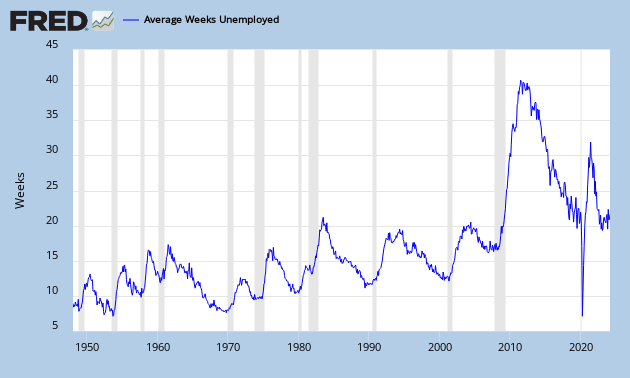One thing I've learned since I started blogging is how much people want to see information that puts our current economic situation in perspective. One way to do that, a natural one to me since my specialty is international relations, is to use multi-country comparisons to see where the U.S. stands. Usually this means comparisons with other industrialized countries, although my post on employment protection had data for Brazil, Russia, India, and China as well because the Organization for Economic Cooperation and Development provided it. Moreover, it was striking that the United States would have even worse standards than some developing countries.
Besides that kind of "cross-sectional" comparison of multiple countries at a single point in time, another way to gain perspective is through "longitudinal" comparison of data on one issue through time. Today's post takes that approach. I decided to learn how to use the St. Louis Federal Reserve Bank data you often see in other blogs--although it turns out "learn" is too strong a word because the "FRED" website (https://research.stlouisfed.org/fred2/) is so simple to use. That set me up for a shock to find out how bad long-term unemployment (usually defined as 26 weeks or more) is today. This is a critical issue because the longer you are out of work, the less likely you are to ever find a job again. Unemployment is also critical for health care, as most Americans still get their health insurance through their employers.
As everyone knows, long-term unemployment has been a big problem in the current crisis. But "knowing" isn't the same as having perspective. For that, we need a comparison. It turns out that the average duration of unemployment over the last few months is almost exactly twice as high as the previous peak in 1983 in the aftermath of the Reagan recession. The current average of over 40 weeks is completely unprecedented historically (as is the median length of unemployment, which was also twice that of prior peaks at about 22 weeks when Politifact reported on it in May 2011). But you have to see it to really understand it: Unemployment duration has increased steadily even since the end of the official recession, and may finally have topped out at 40.9 weeks in November 2011. Let's hope we're finally seeing a reduction.


To me it appears that what happened in 2007 was the shedding, probably permanent, of a huge slice of the US labor force.
ReplyDeleteAt the same time we saw the largest of the post-Reagan raids on citizen's holdings in the form of property and obligatory holdings like pensions, investments and savings. It doesn't matter whether the wealthy acquired that or whether it was vaporized, what matters is that the original owners don't have it anymore.
The result is reduction of the ability of the majority to influence business, the government or each other. That's all wealth is, after all.
Is there any reason to believe that US unemployment will ever return to pre-2007 levels? I don't see it.
This is an incredibly biased account of economic trends in the US... Please take more care in preparing your charts next time.
ReplyDeleteRon Paul 2012
What's biased about it? It's just basic Bureau of Labor Statistics data. Now that I know how, I could superimpose the trend line for median duration of unemployment, but it would also come out as twice as high as the previous postwar peak, as noted in the Politifact link.
DeleteMoreover, it's just a fact that the U.S. does worse than other industrialized countries on a lot of social and economic indicators. You can easily verify this by going to the CIA World Factbook and looking at its country comparison tables.
It suits that the commenter is all of: Ron Paul supporter, anonymous, and without even an actual thesis to assert.
DeleteAs data by itself it is quite surprizing, but with no context as to what type of jobs were lost, or eventually regained, and for how long, it is a little mute. Perhaps all these workers are now superfulous to businesses needs with much of America's manufacturing having been out sourced. Anyway you look at it these folks will not be able to contirbute to either production or as consumers besides the social and individual stress caused by unemployment of such lenghty duration.
ReplyDelete